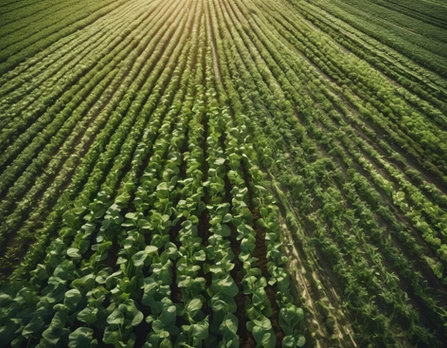Microbiome Farming Innovation: The Future of Sustainable Agriculture

The agricultural sector is undergoing a revolution. As conventional farming faces challenges like soil degradation, declining yields, and environmental concerns, Microbiome farming innovation is emerging as a transformative solution. By leveraging the power of beneficial microorganisms, this approach enhances soil health, boosts crop productivity, and promotes sustainability.
At Microbiome, we are at the forefront of this innovation, delivering cutting-edge microbial technologies that empower farmers and protect the planet.
What is Microbiome Farming Innovation?
Microbiome farming innovation refers to the strategic use of natural soil microbes to support crop growth and improve farming outcomes. The soil Microbiome —a complex community of bacteria, fungi, and other microorganisms—plays a vital role in nutrient cycling, plant immunity, and soil structure.
By enhancing this natural ecosystem, farmers can reduce dependency on chemical inputs and improve long-term soil fertility.
Why Microbiome Farming Innovation Matters
The global population is growing, but arable land is shrinking. Farmers need smarter, more sustainable tools to meet demand without harming the environment. Microbiome farming innovation offers exactly that. Here’s how it helps:
1. Improves Soil Health
Microbial products enhance organic matter decomposition, create humus, and increase microbial biodiversity. This leads to improved water retention, better aeration, and more resilient soil.
2. Increases Crop Yield Naturally
Healthy soil microbes improve nutrient availability and uptake, which directly boosts plant growth and productivity without synthetic boosters.
3. Reduces Chemical Dependency
By replacing or reducing the use of fertilizers and pesticides, microbial farming solutions help restore ecological balance and lower farming costs.
4. Restores Depleted Land
Years of monoculture and chemical usage have damaged soils worldwide. Microbiome-based techniques revitalize these soils, making them fertile and productive again.
Microbiome’s Approach to Farming Innovation
At Microbiome, we have developed a proprietary range of microbial products that are tailored for different crops, climates, and soil types. Our solutions focus on delivering maximum efficiency with minimum environmental impact.
✔️ Customized Microbial Formulas
Each field is unique. Our microbial formulations are designed after analyzing local soil conditions, crop type, and farming goals to ensure the best outcomes.
✔️ Simple Application Methods
Microbiome solutions can be applied through seed coatings, soil drenches, or irrigation systems—offering farmers flexibility and ease of use.
✔️ Scientifically Proven Results
Research and field trials confirm that Microbiome farming innovation improves root development, crop vigor, and yield consistency.
How to Implement Microbiome Farming on Your Land
Starting with Microbiome farming innovation is easy and effective. Here’s a basic roadmap:
Step 1: Soil Assessment
Begin with a comprehensive soil analysis to understand its microbial activity, pH levels, and nutrient composition.
Step 2: Select the Right Product
Based on your crop and region, choose a microbial blend from Microbiome’s range that best fits your farming needs.
Step 3: Apply and Monitor
Use the recommended method—spray, soak, or drip—to introduce microbes to your soil. Track the changes in plant health and soil condition over time.
The Science Behind Microbiome Farming Innovation
Soil microbes act as natural biostimulants. They break down organic matter, solubilize nutrients like phosphorus and potassium, and suppress harmful pathogens. Additionally, some microbes form symbiotic relationships with plant roots, such as mycorrhizal fungi, which expand root access to water and nutrients.
Through Microbiome farming innovation, we harness this science to create healthier, more productive farms.
Environmental Impact and Sustainability
The benefits of Microbiome farming innovation go beyond farm boundaries. Reducing chemical input means fewer pollutants entering water sources and fewer emissions from fertilizer production. Moreover, healthier soils trap more carbon, contributing to climate change mitigation.
Sustainable farming is no longer optional—it’s essential. Microbiome helps farmers stay ahead by combining environmental responsibility with economic viability.
Common Misconceptions About Microbial Farming
Myth: Microbes replace all fertilizers.
Truth: They don’t completely replace nutrients but significantly reduce the need for synthetic additives.
Myth: It takes years to see results.
Truth: Many farmers observe improvements in soil texture, plant health, and yield in the very first season.
Myth: Microbial farming is only for organic farms.
Truth: Conventional farms can also benefit greatly from microbiome innovations.
Conclusion: Embrace Microbiome Farming Innovation
The future of agriculture lies in regenerative practices that enhance, rather than exploit, natural resources. Microbiome farming innovation empowers farmers to grow more with less—less chemical input, less water waste, and less environmental damage.
At Microbiome, our mission is to deliver science-based, scalable solutions that benefit both farmers and the planet. Whether you’re a small-scale grower or a large agricultural enterprise, our microbial technology can help you build healthier soil, stronger crops, and a more sustainable future.
